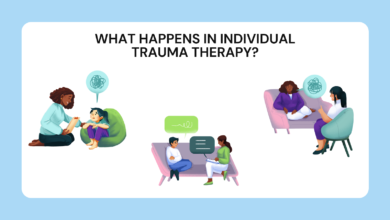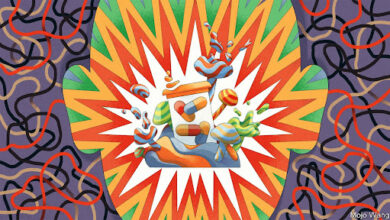Why Your Brain Needs Therapy Like Your Body Needs Exercise

In today’s fast-paced world, we prioritize physical health—hitting the gym, eating nutritious meals, and getting enough sleep.
But what about our mental health?
Our brains need similar deliberate care, which our bodies need for optimal performance, just like physical movement and wellness caregiving. The brain requires therapy, which functions like physical exercise for the body to build strength while healing current problems and enhancing operational capacity.
Therapy enables individuals to develop resilience as well as emotional well-being regardless of their stress, anxiety, depression, relationship problems, or desire for personal growth. The importance of mental health counseling matches physical exercise levels in personal development, while various therapeutic methods support personal growth.
Let’s explore why the brain requires therapy for overall well-being.
Mind-Body Connection
Continued scientific investigations demonstrate that brain wellness is completely connected to human well-being. Stress in life generates increased blood pressure, lowers immune function, and damages the digestive system.
An undiagnosed case of anxiety or depression can transform into three different symptoms, including sleeplessness, body pain, and muscle tension. Therapy functions similarly to exercise by releasing endorphins, which enhance mood, reduce cortisol hormones, and improve brain health and emotional control.
It develops healthy neural pathways to improve emotional control and establishes beneficial thinking patterns corresponding to weightlifting’s muscular development.
Benefits of Therapy vs. Exercise
| Therapy for the Mind | Exercise for the Body |
| Reduces stress & anxiety | Lowers cortisol levels |
| Improves emotional regulation | Boosts endorphins |
| Enhances self-awareness | Increases body awareness |
| Strengthens relationships | Improves physical stamina |
| Helps process trauma | Reduces risk of chronic illness |
The approaches work simultaneously as prevention and repair by solving problems ahead of time while fixing existing injuries.
How Different Therapies Support Mental Fitness
Multiple types of therapy serve different purposes through the following approaches:
1. Cognitive Behavioral Therapy
The brain workout involved in CBT helps people develop strong mental abilities to recognize unhelpful thoughts while transforming them into positive structures.
People who receive CBT treatment experience success with their anxiety, depression, and obsessive-compulsive disorder because it changes their automatic negative thoughts into healthier alternatives.
2. EMDR Therapy
Eye Movement Desensitization and Reprocessing (EMDR) is a therapeutic method that resembles physical therapy for brain healing by helping traumatized brains reduce emotional strength.
3. Mindfulness & Neurofeedback
Through mindfulness meditation and neurofeedback treatment, people can develop mental yoga abilities that strengthen brain wave control for better concentration while lowering pressure and maintaining emotional steadiness.
4. Couples Therapy
Maintaining relationships demands similar efforts as people need to maintain their muscles. Therapy for couples teaches members how to communicate better and establishes strong emotional bonds while teaching them how to resolve conflicts, thus stopping emotional deterioration.
5. TMS Therapy
The brain therapy known as Transcranial Magnetic Stimulation (TMS) provides a similar effect as deep-tissue body massages to activate underused neural pathways for patients with treatment-resistant depression.
How Therapy Helps
1. Therapy Improves Cognitive Function, Just Like Exercise Enhances Physical Performance
Talk therapy builds neuroplasticity because research demonstrates its capacity to increase adaptive brain function, which creates new neural links.
It is beneficial to physical stamina improvement in the same way therapy leads to the development of problem-solving abilities, enhanced decision-making, and improved focus.
Psychological methods incorporating CBT and mindfulness practice lead to reduced mental cloudiness and better cognitive understanding.
2. Therapy Helps “Detox” Negative Thoughts Like Exercise Cleanses the Body
Mental toxins, which include rumination, self-doubt, and fear, arise when we experience stress and trauma. Just like sweating eliminates body toxins after exercise, therapy is an emotional purifying process that releases trapped feelings.
3. Therapy Boosts Self-Esteem Like Exercise Improves Body Image
Thriving through emotional struggles in therapy allows people to build positive self-confidence and enhanced self-worth. Just as physical fitness fosters body positivity, mental fitness fosters self-acceptance.
4. Therapy Helps Break Bad Habits Like Exercise Replaces Sedentary Lifestyles
The therapeutic approach of Cognitive Behavioral Therapy (CBT) shows patients how to restructure destructive habits toward addiction or self-damaging patterns. Exercise functions to replace passive behaviors in the same way therapy substitutes unhealthy coping reactions (for example, eating to soothe emotions or withdrawing).
5. Therapy Enhances Relationships, Just as Fitness Improves Physical Attraction
The process of couples therapy establishes emotional closeness between partners in ways that are similar to the way exercising leads to better physical bonds and connections.
An individual’s mental and emotional state forms their relationship health, which parallels their dating confidence that develops through physical well-being.
Signs Your Brain Needs a Therapy “Workout”
The signs that you need therapy treatment may appear different for each individual. Consider these signs:
- Having stress symptoms that persist due to feeling exhausted from burnout indicates the need for therapy.
- Regular emotional function diminishes into numbness, which switches to extreme emotional reactions – A sign of improper emotional regulation.
- Sleep disturbances – Insomnia or excessive fatigue
- Avoiding social interactions – Withdrawing from loved ones
How to Start Your Mental Fitness Journey
- Find the right therapist by seeking professionals who have specialty experience within your needs (CBT for anxiety and EMDR for trauma, etc.).
- Similar to exercising, therapy achieves the best outcomes through continuous regular appointments.
- Therapeutic success will increase when you integrate sessions with physical exercise routines, quality sleep habits, and proper nutrition.
- The therapy process enables you to monitor your overall development by observing positive changes in your emotional state, social connections, and adaptive abilities.
Train Your Mind Like Your Body
Therapy functions similarly to exercise by developing mental strength, just like physical exercise, which strengthens the body. This type of care benefits more than crises because its proactive measures strengthen emotions while improving concentration and connecting people more deeply.
Professional therapy teaches permanent tools that help you in stress management, trauma recovery, and personal growth. Your brain must receive comparable care, the same as you give your physical health.
Developing your mental fitness requires immediate attention because waiting until you are overwhelmed will be too late. Strategic appointment booking for therapy resembles setting workout schedules, so you will observe that clarity, confidence, and peace of mind become strong.
Ready to start?
The mind is your strongest resource; therefore, you must care for it.




